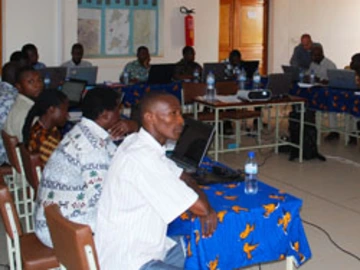Interactive data for people and their environment: Geoportal ready to go for West Africa
June 16, 2009.
„This geoportal is an enormous achievement and of real practical help to us“, says Jacqueline Zoungrana, a director of the national water agency (DGRE) in Burkina Faso, West Africa. “We are urgently in need of good data that enable us to make better decisions related to water resources management. This geoportal not only provides huge data sets of high quality, it also enables us to link them in an interactive way”, she adds enthusiastically.
Scientists from the GLOWA Volta Project, which is led and carried out by the Center for Development Research (ZEF) at the University of Bonn, developed the geoportal in cooperation with the Department of Computer Science III at the University of Bonn. The tool was introduced to Ms Zoungrana and around 20 of her African colleagues from Ghana and Burkina Faso during one of the recent training activities organized for regional users, stake holders and decision makers, from politics, water resources institutions and science. The project in the West African Volta Basin is part of the umbrella program „Global Change and the Hydrological Cycle (GLOWA)“, which was initiated by the German Federal Ministry for Education and Research (BMBF) in 2000.
„We have integrated up to 400 datasets by now – our goal is around 1,000”, says Antonio Rogmann, a geoscientist in the GLOWA Volta project, and responsible for the geoportal. “These are data on hydrological and meteorological measurements, land use, vegetation and vegetation changes, soil, and also on settlements, population, households and their consumption patterns. The most remarkable components of this portal are the interactive maps – we have developed around 60 so far. Users can combine these with data and create new maps fitting their demand”, Rogmann explains.
„This geoportal is unique for West Africa“, says Jacqueline Zoungrana. “It provides us an excellent basis to work with. We need those data to make better decisions in the realm of water resources management. If we know, for example, how much water is running off into a water reservoir, we can assess how much is still available for electricity, industry, and households. The scientists of the GLOWA Volta project not only provide us with the required knowledge, but also enable us to continue the work on our own in the future”, she adds.
“Knowledge cooperation and transfer is a crucial component of our research project, which deals with the regional impact of global climate change”, explains Professor Paul Vlek, project leader and executive director of ZEF. “We achieved <image style="margin-right: 12px; margin-top: 12px" src="http://www.zef.de/fileadmin/webfiles/downloads/press/Geoportal_Ghana_476_360.jpg" align="left">this in the first place by setting up research partnerships and building institutional know how, but in particular did so through our efforts to develop human capacity. We educated 81 students in the framework of the program, and 44 of them participated in ZEF’s Interdisciplinary Graduate Program. Around 80% of the students have returned to their West African home region. Since we are in the final phase of this project, it’s important to reinforce and continue south-south-cooperation. The project and the introduction of the geoportal have brought together local and regional institutions that would otherwise have never collaborated or at least not to such an extent. Our project partners will take care of the continuation and fine tuning of the project now”, says Vlek.
Downloads: Pressemitteilung deutsch


